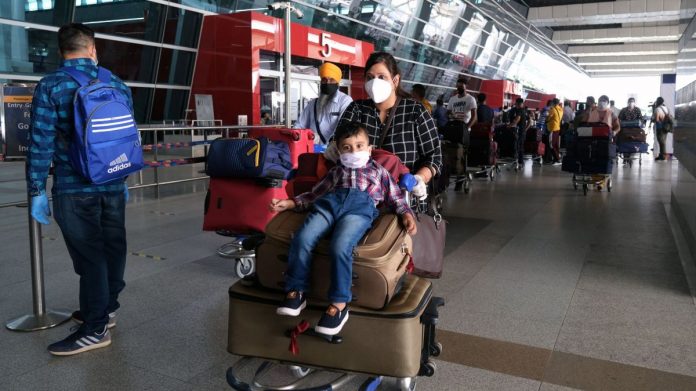
New Delhi: Children below five years are exempted from both pre-and post-arrival testing for COVID-19 in India, according to the revised guidelines for international arrivals released on Thursday.
However, if found symptomatic for coronavirus infections on arrival or during the home quarantine period, they shall undergo testing and be treated according to laid down protocol, the guidelines said.
Highlighting that the global trajectory of the COVID-19 pandemic continues to decline with certain regional variations, the document stated the need to monitor the continuously changing nature of the virus and evolution of SARS-CoV-2 variants of concern must still remain in focus.
The existing guidelines (issued on February 17 with subsequent addendums) for international arrivals in India have been formulated taking a risk-based approach. In view of increasing vaccination coverage across the globe and the changing nature of the pandemic, the existing guidelines for international arrivals in India have been reviewed, the health ministry said.
“Children under 5 years of age are exempted from both pre-and post-arrival testing. However, if found symptomatic for COVID-19 on arrival or during the home quarantine period, they shall undergo testing and treated as per laid down protocol,” it said.
This standard operating procedure shall be valid from November 12 (00.00 Hrs IST) till further orders, the ministry stated.
Also, 15 days must have elapsed since the completion of the COVID-19 vaccination schedule.
According to the existing guidelines, if travellers are fully vaccinated and coming from a country with which India has reciprocal arrangements for mutual acceptance of WHO approved COVID-19 vaccines, they shall be allowed to leave the airport and need not undergo home quarantine.
They shall self monitor their health for 14 days’ post-arrival.
If partially or not vaccinated, the travellers need to undertake measures which include submission of sample for post-arrival COVID-19 test at the point of arrival after which they will be allowed to leave the airport, home quarantine for seven days, re-test on the eighth day of arrival in India and if negative, further self-monitor of their health for next seven days.
“15 days must have elapsed since completion of the COVID-19 vaccination schedule,” the guidelines said.
Travellers under home quarantine or self-health monitoring, if develop signs and symptoms suggestive of COVID-19 or test positive for COVID-19 on re-testing, they will immediately self isolate and report to their nearest health facility or call national helpline number (1075)/ state helpline number.
On arrival deboarding should be done ensuring physical distancing and thermal screening would be carried out in respect of all the passengers by the health officials present at the airport.
The self-declaration form filled online shall be shown to the airport health staff.
The passengers found to be symptomatic during screening shall be immediately isolated and taken to medical facility according to health protocol. If tested positive, their contacts shall be identified and managed according to laid down protocol.
Contacts of the suspect case are the co-passengers seated in the same row, three rows in front and three rows behind along with identified cabin crew. Also, all the community contacts of those travellers who have tested positive (during home quarantine period) would be subjected to quarantine for 14 days and tested as per ICMR protocol, the guidelines stated.
Also read: Modi govt lifts additional checks and restrictions imposed on UK travellers
Subscribe to our channels on YouTube & Telegram
Why news media is in crisis & How you can fix it
India needs free, fair, non-hyphenated and questioning journalism even more as it faces multiple crises.
But the news media is in a crisis of its own. There have been brutal layoffs and pay-cuts. The best of journalism is shrinking, yielding to crude prime-time spectacle.
ThePrint has the finest young reporters, columnists and editors working for it. Sustaining journalism of this quality needs smart and thinking people like you to pay for it. Whether you live in India or overseas, you can do it here.

